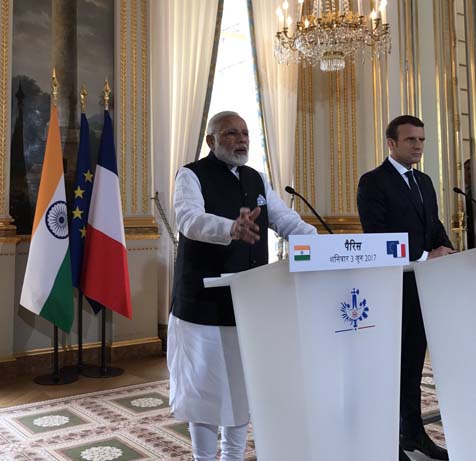Protecting climate an article of faith for us, says PM Modi
Speaking after holding wide-ranging talks with newly- elected French President Emmanuel Macron at the Elysee Palace here, Modi said the Paris Agreement reflects "our duty towards protecting the Earth and our natural resources. For us, this is an article of faith."

Paris: Prime Minister Narendra Modi today said India will go above and beyond to protect climate as he termed the Paris climate agreement as a shared legacy of the world, a day after the US president walked out of the deal.
Speaking after holding wide-ranging talks with newly- elected French President Emmanuel Macron at the Elysee Palace here, Modi said the Paris Agreement reflects "our duty towards protecting the Earth and our natural resources. For us, this is an article of faith."

"Paris climate agreement is a shared legacy of the world. It will benefit the future generations as well," Modi said addressing a joint press event with Macron.
His remarks came after US President Donald Trump announced plans to withdraw from the Paris climate change deal on curbing carbon emissions, which had been agreed by more than 190 nations. Trump said the agreement unfairly benefited countries like India and China.
Also Read | PM Modi: India to receive first Rafale aircraft next month
Also Read: India committed to Paris climate deal, says Narendra Modi in Russia
India would "continue working on this...above and beyond the Paris accord," the prime minister said.
Also Read |
PM Modi offers prayers at Somnath Temple, pays tribute to Sardar Patel
"We have natural resources because our previous generations protected these resources. We must do the same for our future generations," Modi said.
The Paris Agreements central aim is to strengthen the global response to the threat of climate change by keeping the global temperature rise in this century well below 2 degrees Celsius above pre-industrial levels and to pursue efforts to limit it to 1.5 degrees Celsius.
The landmark agreement, which entered into force last November, calls on countries to combat climate change and to accelerate and intensify the actions and investments needed for a sustainable low carbon future, and to adapt to the increasing impacts of climate change. (With PTI inputs)
 Dynamite News
Dynamite News 